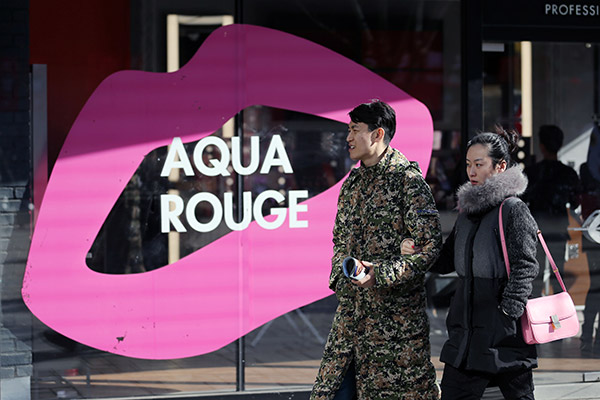
Young consumers shop in the popular Sanlitun area of Beijing on Feb 14. (Photo/China Daily)
Low price is no longer an incentive to entice Chinese consumers, especially the millennials, and merchants should forge personal ties to retain customer loyalty, according to a latest study by consultancy Accenture.
Three-fourths of the 1,303 consumers surveyed have switched providers when they shopped in the past year, said the U.S.-headquartered firm. Almost a quarter of the respondents said their expectations of brands have changed radically.
While organizations spend billions of yuan each year on customer loyalty programs like membership campaigns, the fact is, they are not effective. So, new forms of retail sales have emerged, mainly driven by creative digital experiences, said Yu Jin, managing director of Accenture Strategy Greater China.
"The traditional 'low price' and 'reliable service' mechanics are no longer as effective at driving loyalty. Organizations that stick to traditional approaches and don't explore the new drivers influencing loyalty risk draining profitability and pushing customers away," Yu said.
Vendors are encouraged to add a human touch during interaction with millennials. The survey showed 62 percent of customers like to be connected by merchants with small tokens of affection, including personalized discounts and gift cards.
Almost two-thirds of respondents expressed loyalty to brands that offer them the opportunity to personalize products and create something that is bespoke to them.
And 69 percent said they prefer brands to interact with them through appropriate channels of communication like the company's official social media accounts and microblog site Weibo. Partnership with social influencers, such as famous bloggers, are also key in maintaining customer relationships.
Millennials are also thrill-seekers, the survey found. About 63 percent said they are loyal to brands that engage them with co-creation of products and services. Another 64 percent said they are intrigued by "multi-sensory" experiences using new technologies such as virtual reality and augmented reality.
The results are in line with what e-commerce companies are doing today to become popular among buyers who are tech-savvy, spend-happy, and pursue unique shopping experiences.
For instance, social commerce took the center stage at the annual sales gala last December on Alibaba's customer-to-customer site Taobao, where consumers shared and recommended products via virtual communities and webcasts. Endorsed by a popular comedian on social media, a Chinese herbal skincare toner saw its daily sales surge to four times that of offline stores.
In the run-up to the Nov 11 shopping festival, Alibaba offered the world's first end-to-end virtual reality shopping experience in which the entire transaction, from browsing, order to payment, was completed within the VR environment. It also live-streamed an eight-hour fashion show, with brands from Burberry to UGG taking part, allowing viewers to order in real time everything they saw on the catwalk.
Similarly, Red, or Xiaohongshu, a Chinese e-commerce site featuring direct shipping of foreign goods, forged an online virtual community. It works by letting its users-65 percent or more are young and well-educated women-post pictures of their favorite products online. It then connects them with sellers abroad. From anti-aging masks to Folli Follie watches, products get sold this way.
By encouraging users to share their favorite products on the online forum, it analyzes user data to determine what will be sold on its website, said its co-founder Qu Fang.
Kaola, an e-commerce site, has also found unique ways to pamper customers. For instance, it has teamed up with Japanese cosmetics information portal Cosme, which publishes a guide for women across China seeking skincare solutions. Kaola identifies and offers these products to tens of thousands of its users.
According to Kaola spokesperson Wang Zheng, the firm collaborates with brands to organize afternoon tea gatherings and outbound trips, in a bid to win the hearts of the young and growing middle class.
"Every consumer has a natural instinct around what makes them 'stick' to a brand. An appetite for the extraordinary, multi-sensory experiences, hyper-personalization and co-creation ... are changing consumer dynamics around loyalty, and forcing brands and organizations to review and improve their approach and programs," said Yu.


















































